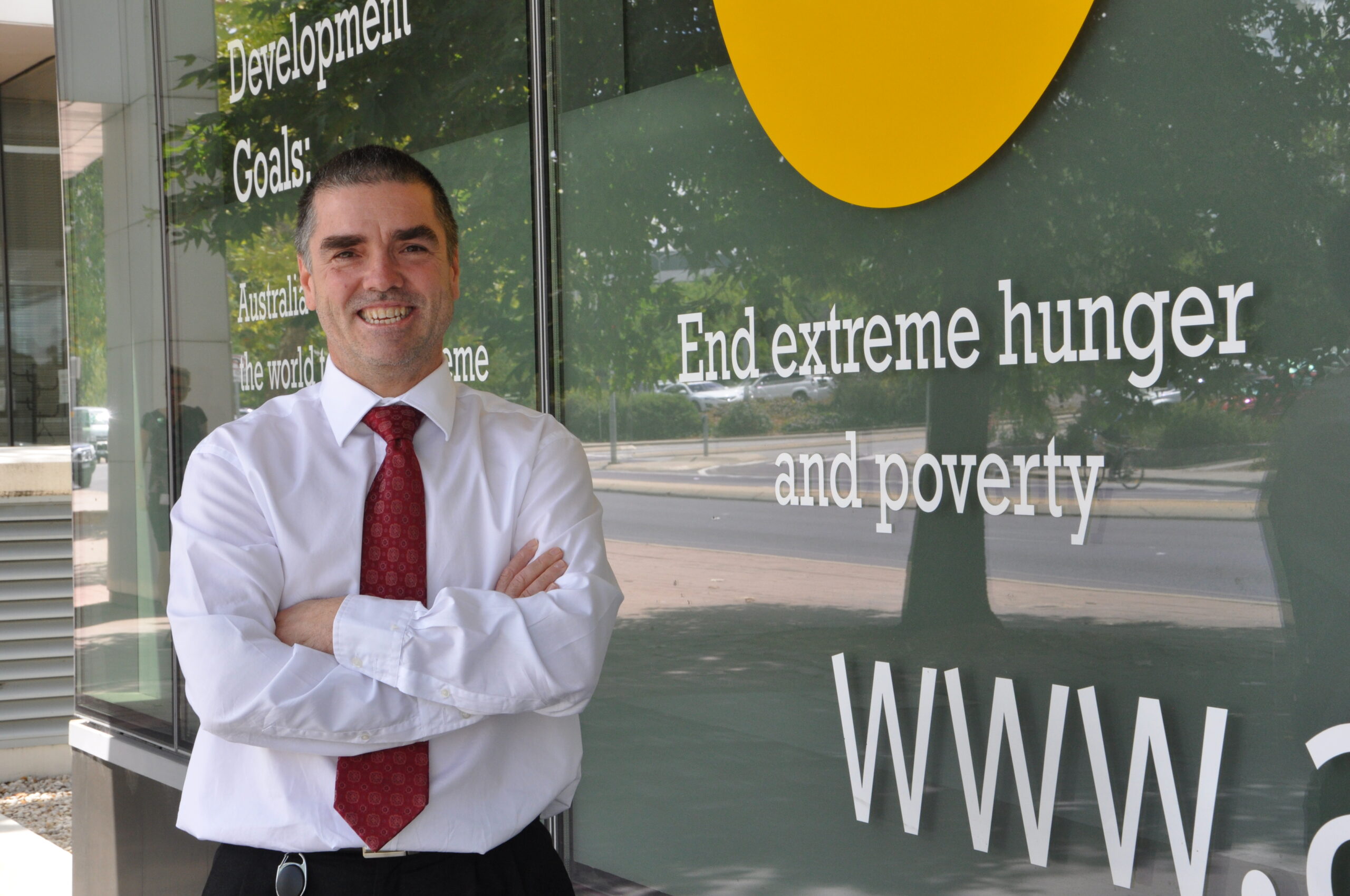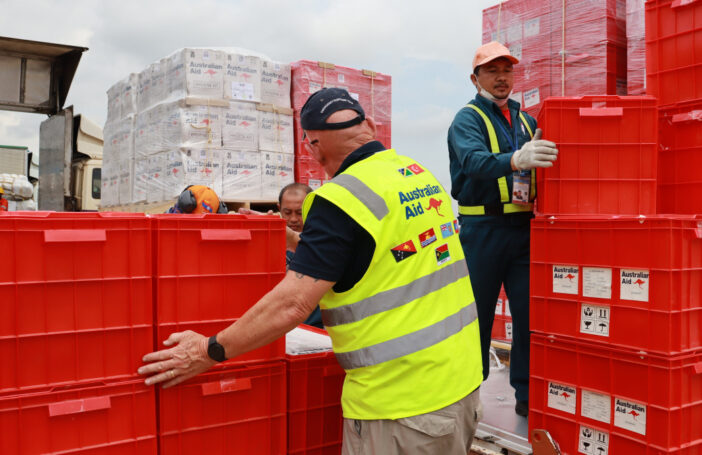Jonathan: What are your responsibilities as the Chief Economist at AusAID?
Michael: AusAID’s purpose is to use Australian aid to help people overcome poverty. As Chief Economist, my main responsibility is to lead a team of economists providing advice and guidance to support the most effective use of Australian aid in meeting this purpose. This involves applying economic principles and frameworks to spending and programming questions.
Jonathan: Could you give an example of this in practice?
Michael: Say AusAID is considering funding a program to deliver maternal and child health services in a partner country. We need to understand what services are being provided by the government and NGOs, and how our provision of health services will impact on that. In order to do this, we need to understand the health market and related markets.
The operation of markets – how they work, when they don’t work and what to do when they don’t work – is the core business of economists. Will we just be drawing nurses from the government to our project? Will the government respond by spending less on health? How are we going to allocate the health services? Is it on a first-come-first-served basis or do we try some sort of needs-based system, or a user-pays system? We also need to understand whether health spending is the most effective intervention, given the needs and our capacity to make a difference. Finally, we need to understand the broader health policy environment in the country: how fiscally sustainable are the government’s operations and aspirations, and what policy reforms should be considered.
Put simply, my role is to help AusAID do this better, because that will lead to more effective spending of aid, and a greater positive impact on people living in poverty.
Jonathan: Could you please run us through your background?
Michael: I have taken a roundabout path to get to this place. Most of what I have done over the past 25 years has prepared me for this, but I never planned to end up here. I finished university with an economics honours degree and joined the Department of the Prime Minister and Cabinet (PM&C) as a graduate in the ’80s. I spent a couple of years there and then went to the US and completed my doctorate. I came back to Australia and joined the Treasury Department in the mid ‘90s, and then moved over to the Finance Department for a while.
While I was at Finance, the independence referendum and subsequent conflict in Timor Leste happened. In early 2000 I had the opportunity to lead a team of Finance officials to help build the Ministry of Finance. In the short term this meant capacity substitution – delivering the functions of a finance ministry – with the idea that we were also engaged in capacity building in the more medium term.
Jonathan: What did you take away from that experience?
Michael: The most important thing I learnt was the differing timeframes in development. I naively expected to be out in 18 months having completely handed over a world standard budget process to a functioning finance ministry. A good friend with considerable field experience wryly chuckled, “You should be thinking 18 years!” Twelve years on, it’s clear who was right.
After returning briefly to Australia, I had the opportunity to go to Afghanistan and spent about two and a half years working as the senior advisor to the then Finance Minister Ashraf Ghani. This was an amazing time, but also quite bittersweet. I worked on genuinely critical reforms like introducing a new currency. While this received little international fanfare, it is fundamental to the functioning of an economy and society. I also got to see the wrinkles in the international political and development architecture that compound the considerable challenges that countries like Afghanistan face.
Jonathan: And when you got back to Australia?
Michael: During my time in Timor Leste and Afghanistan there were a number of issues that I wanted to explore further but didn’t have the time and space. This was particularly around the economic impact the international community makes in post-conflict countries, including on the labour market, domestic revenue mobilisation and donor coordination issues. By 2007, through various research opportunities, I managed to write up and publish the things I had found most interesting and challenging.
Around this time I got nervous. I was at risk of moving from my profession as a public policy economist, with a good framework and a set of skills that can be applied in rich or poor countries. I was at risk of becoming a ‘development expert’. So I went back to public policy in Australia, first at the Australian Competition and Consumer Commission (ACCC) and then to PM&C.
The ACCC was a great learning experience. Anybody who works on policy or crafts legislation needs to spend time trying to actually administer or enforce some legislation, it is a real eye-opener.
The role of AusAID Chief Economist came on the horizon in 2011 when I was at home for the year with my daughter. I had some good and frank chats with Peter Baxter about what I would want to do at AusAID and the direction in which he wants to take the agency. In clichéd management speak, we had ‘vision alignment’, and here I am.
Jonathan: Your experience in fragile states is fascinating. Is that a path you would suggest to people that aspire to a career in development?
Michael: First it is important for professionals to develop their skills. What stood me in strong stead in Timor Leste and Afghanistan is having worked on public policy issues, with a cohort of strong senior economists in Treasury, Finance and PM&C. Working with people at the top of their field and building up your skills, your craft, so that you’ve got a strong framework to apply in the development space is crucially important.
Now, I’m not an economic hegemonist, I think there are a range of disciplines that are absolutely important. For example, a good cultural anthropologist who understands how societies and networks function is critical when you’re designing a community development program. But they still need to be properly trained in their discipline and have experience in its practice so that they can apply it to development in a positive way.
The real risk, particularly in the fragile/conflict space, is a person who has had a generalist career constantly ending up in very specialist roles. So much of what happens in development is actually quite specialised. It’s a big risk to get people who are very passionate and very committed but who don’t bring a particular set of skills to fill those roles. In the do-no-harm mantra, I’m not sure they always tick that box.
Jonathan: What advice could you give to aspiring AusAID graduates or people trying to move into AusAID at a junior level?
Michael: To be honest, I came in at a senior level, so I am not sure I am the best person to ask. Most of what I would say can be found in any general application guide: know the major things that you have to offer; know AusAID’s business (read publicly available documents – both policy documents and documents about where the agency is going) and understand the selection process.
Jonathan: If you had one piece of advice for aspiring development careerists, what would it be?
Michael: It’s really hard to do effective policy in rich or poor countries without quantitative skills. Being able to undertake qualitative analysis is very important, but if you don’t have quantitative skills you can’t effectively assess poverty.
Unless you have enough familiarity with poverty data, how do you know whether you’re helping poor people or not? Unless you have quantitative skills, how do you know if you’re getting good value for money? If you don’t have quantitative skills, how do you assess allocations across different sectors, how do you assess the effectiveness of programs?
That doesn’t mean you need a PhD in economics or mathematics. But it does mean you need to be fluent with numbers and basic mathematic concepts like distributions, growth rates and measurement. This has not always been the case with people I have encountered working in development.
This is a part of our blog series ‘Careers in Development’. The rest of the series can be found here.
Michael Carnahan is the Chief Economist at AusAID. Jonathan Pryke is a Researcher at the Development Policy Centre.




